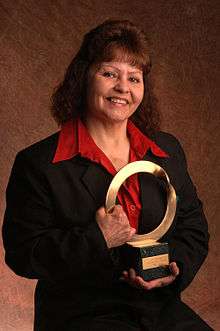Julia Bonds
| Julia "Judy" Bonds | |
|---|---|
 | |
| Born |
August 27, 1952 Marfork Hollow, West Virginia |
| Died |
January 3, 2011 (aged 58) West Virginia |
| Occupation | Environmental activist, community leader |
Julia "Judy" Bonds (August 27, 1952 – January 3, 2011) was an organizer and activist from the Appalachian Mountains of West Virginia, United States. Raised in a family of coalminers, she worked from an early age at minimum wage jobs. Bonds was the director of Coal River Mountain Watch (CRMW).[1] She has been called "the godmother of the anti-mountaintop removal movement."[2]
Environmental activism
Much of her organizing activity focused on the role of the mine operator Massey Energy of Richmond, Virginia and the devastation in Coal River Valley's Marfork Hollow as well as other communities in Appalachia.[3] Bonds testified against the company at regulatory hearings, filed lawsuits against surface mining and led protests against Massey. By 2003, she had led the CRMW into a partnership with the United Mine Workers Union to halt mining companies' dangerous use of overweight coal trucks and to convince the state's mining oversight agency to better protect valley communities from mine blasting.[4] In 2009, she brought in actress Daryl Hannah and NASA scientist James Hansen to protest the proximity of a Massey coal slurry dam and storage silo in the vicinity of a West Virginia elementary school.[5] Coal River Mountain Watch, the Sierra Club and other groups filed a lawsuit in April 2010 accusing Massey Energy of violating the U.S. Clean Water Act.
For years, she dreamed of a "thousand hillbilly march" in Washington, DC. In September 2010, that dream became a reality as thousands marched on the White House for "Appalachia Rising"',[6] a mass movement to persuade US Congress to halt to the issuance of valley fill and other types of permits that allow companies to completely remove a mountain top in the search for coal. After sitting in at the offices of the Army Corps of Engineers, blockading the EPA and PNC Bank, an unprecedented number of about 100 protesters were arrested at the White House.[7]
Awards
She was awarded the Goldman Environmental Prize in 2003, for leading the fight against the mining practice called mountaintop removal mining in the Appalachian mountain range.[8] In an interview after receiving the award, Bonds told how she relies on the teachings of her mother, her religious convictions (from both her Southern Baptist and her Cherokee backgrounds) and from the writings of Martin Luther King and Gandhi:
My sense of justice and outrage came from my mother. .... We are here to steward this land ... I know what I'm doing is right. They can call me whatever they want. I'm not stopping.[9]
Vernon Haltom, co-director of the Coal River Mountain Watch, wrote about Bond's passion for environmental justice in Appalachia:
Judy endured much personal suffering for her leadership. While people of lesser courage would candy-coat their words or simply shut up and sit down, Judy called it as she saw it. She endured physical assault, verbal abuse, and death threats because she stood up for justice for her community.[1]
Bonds died of cancer on January 3, 2011, at the age of 58.[2]
See also
References
- 1 2 "Remembering Judy Bonds". Coal River Mountain Watch. Archived from the original on July 23, 2011. Retrieved August 11, 2011.
- 1 2 Kate Sheppard (January 4, 2011). "Mourning the Loss of the "Godmother of the Anti-Mountaintop Removal Movement". Mother Jones. Retrieved August 11, 2011.
- ↑ Rainforest Action Network (September 14, 2009). Judy Bonds on Mountain Top Removal and its impacts (video). YouTube. Retrieved August 11, 2011.
- ↑ "West Virginia activist Julia Bonds takes on mountaintop-removal mining". 15 April 2003. Retrieved 4 January 2018.
- ↑ PressHerald-Dispatch.com, The Associated. "Activists plan protest at Massey coal plant". Retrieved 4 January 2018.
- ↑ Freeman, Jordan. "More than 100 Arrested at White House Demanding End to Mountaintop Removal". Appalachia Rising. Archived from the original on 20 June 2010. Retrieved 5 January 2011.
- ↑ Appalachia Rising (July 8, 2010) on YouTube. Accessed 4 January 2011.
- ↑ "North America 2003. Julia Bonds. United States. Oil & Mining". Goldman Environmental Prize. Archived from the original on July 22, 2011. Retrieved August 11, 2011.
- ↑ "Personal Perseverance". ACF News Source. Archived from the original on 24 December 2006. Retrieved 18 January 2011.
Further reading
- Appalachian Studies Association. "Appalachian Studies Resources". Retrieved 8 January 2011.
- Eller, Ronald (2008). Uneven Ground: Appalachia Since 1945. Lexington: University Press of Kentucky. ISBN 978-0-8131-2523-7.
- Shnayerson, Michael (May 2006). "The Rape of Appalachia". Vanity Fair. Retrieved January 8, 2010.
- Beth Vorhees, anchor (23 August 2007). Coal-to-Liquids conference, protest in West Virginia (television). West Virginia: West Virginia Public Broadcasting. . Accessed 4 January 2011.
- Appalachian Regional Commission (ARC). "ARC Research, Maps and Data". Retrieved 8 January 2011.
External links
- Thousands Pay Tribute to Judy Bonds: She Has Been to the Mountaintop—and We Must Fight Harder to Save It, Huffington Post, January 4, 2011
- Powershift 2007, Judy Bonds speaks on the No New Coal Movement on YouTube. Accessed 4 January 2011.
- ASA 2008 Judy Bonds on YouTube. Accessed 4 January 2011.
- Elliot, Debbie (April 21, 2008). "New Breed of Lobbyists Hail from Appalachia". All Things Considered. National Public Radio. Retrieved 4 January 2011. .
- Capitol Climate Action, March 2, 2009 on YouTube. Accessed 4 January 2011.
- June 2009, Judy Bonds on talking with pro MTR miners on YouTube. Accessed 4 January 2011.
- On Coal River. Accessed 4 January 2011.
- Coal River Mountain slideshow. Accessed 4 January 2011.